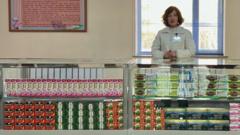After being closed off to the world for over five years due to the pandemic, North Korea has cautiously reopened its doors to Western tourists. A recent group of British travelers, alongside tourists from Australia, Germany, and France, were among the first to explore this enigmatic country since the borders were sealed. The tour consisted of carefully orchestrated visits to remote sites in the economic zone of Rason, with local guides enforcing strict protocols.
Rowan Beard of Young Pioneer Tours noted the importance of respecting the country's rules during these tours, which include refraining from criticizing the regime or engaging in comparative judgments about life in North Korea. Practical considerations loom large, too—travelers are warned of the absence of internet access, phone signals, and the presence of cash machines.
Participants, including British YouTuber Mike O'Kennedy, described the experience as resembling a tightly supervised school trip, with guides accompanying them at all times and adherence to a predetermined schedule. Despite the stringent oversight, glimpses of daily life emerged, illustrating a populace seemingly engaged in labor, albeit with an almost oppressive atmosphere. O'Kennedy recounted witnessing schoolchildren performing an unusual dance to animations depicting military weapons, an unsettling sight reflective of the regime's propaganda.
The itineraries have shifted away from the capital, Pyongyang, as authorities maintain control over these initial explorations. This move to Rason, positioned as a test for potential economic reforms, reveals a facade of capitalist ventures amidst a largely socialist environment, yet it is still cloistered from global influence.
Experiences of the travelers unearthed a spectrum of living conditions; some remarked on the dire state of infrastructure, with dilapidated buildings and inadequate heating contrasting sharply with the sanitized portrayal presented by official photographs. Joe Smith, a seasoned visitor to North Korea, commented on the stark differences between the polished image depicted by the regime and the concerning realities that unfolded during their travels.
Interactions with local guides proved insightful, revealing a mix of knowledge and naivety regarding international affairs due to the regime's pervasive propaganda. These exchanges carried risks, underscoring the delicate balance tourists must maintain to avoid jeopardizing the locals' safety.
However, the decision to reopen to tourism has sparked criticism, with proponents arguing that it might largely benefit the state rather than the average citizen. Human rights advocates emphasize that the financial gain in such ventures predominantly serves the regime, leading to further economic and social disparities.
Ultimately, this initial group of tourists left with as many questions as insights about North Korea, casting a critical eye on the country's enigmatic existence while navigating the complexities of human interaction in an environment of intense control.


















